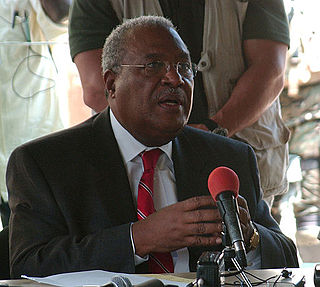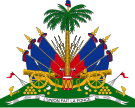
The recorded written history of Haiti began on 5 December 1492 when the European navigator Christopher Columbus happened upon a large island in the region of the western Atlantic Ocean that later came to be known as the Caribbean. It was inhabited by the Taíno, and Arawakan people, who variously called their island Ayiti, Bohio, or Kiskeya(Quisqueya). Columbus promptly claimed the island for the Spanish Crown, naming it La Isla Española, later Latinized to Hispaniola. French influence began in 1625, and French control of what was called Saint-Domingue—modern-day Haiti—began in 1660. From 1697 on, the western part of the island was French and the eastern part was Spanish. Haiti became one of the wealthiest of France's colonies, producing vast quantities of sugar and coffee and depended on a brutal slave system for the necessary labor. Inspired by the message of the French Revolution, Haitian slaves rose up in revolt in 1791 and after decades of struggle the independent republic of Haiti was officially proclaimed in 1804.

Gérard Latortue was the Prime Minister of Haïti from March 12, 2004 to June 9, 2006. He was an official in the United Nations for many years, and briefly served as foreign minister of Haïti during the short-lived 1988 administration of Leslie Manigat.
Matthieu Prosper Avril is a Haitian political figure who was President of Haiti from 1988 to 1990. A trusted member of François Duvalier's Presidential Guard and adviser to Jean-Claude Duvalier, Lt. Gen. Avril led the September 1988 Haitian coup d'état against a transition military government installed after Jean-Claude Duvalier's 1986 overthrow. He was President until March 1990, in a period which according to Amnesty International was "marred by serious human rights violations". He was arrested in 2001, but released in March 2004 after the 2004 Haitian coup d'état overthrew Jean-Bertrand Aristide.
Henri Namphy was a Haitian general and political figure who served as President of Haiti's interim ruling body, the National Council of Government, from February 7, 1986 to February 7, 1988. He served again as President of Haiti from June 20, 1988 until his deposition on September 17, 1988 in the September 1988 Haitian coup d'état.

Elections in Haiti gives information on election and election results in Haiti.

The 2006 elections in Haiti, to replace the interim government of Gérard Latortue put in place after the 2004 Haiti rebellion, were delayed four times after having been originally scheduled for October and November 2005. The elections finally took place on February 7, 2006, with turnout of around 60%. All 99 seats in the Chamber of Deputies of Haiti and all 30 seats in the Senate of Haiti were also contested. Run-off elections for the Chamber of Deputies of Haiti were held on 21 April 2006, with around 28% turnout.
Martial Lavaud Célestin was named Prime Minister of Haïti by President Leslie Manigat in March 1988 under the provisions of the 1987 Constitution, and was approved by the Parliament that formed as a result of the January 17, 1988 elections. He was deposed by the coup that took place on June 20. He was born in Ganthier and was a lawyer by profession. Célestin died on February 4, 2011 at the age of 97.

Michel Joseph Martelly is a Haitian singer and former politician who went on to serve as the President of Haiti from May 2011 until February 2016. He is from Côte-de-fer, a commune located in the South East region of Haiti. Martelly was one of Haiti's best-known musicians for over a decade, going by the stage name Sweet Micky. For business and musical reasons, Martelly has moved a number of times between the United States and Haiti. When travelling to the United States, Martelly mostly stays in Florida. After his presidency, Martelly returned to his former band and sung a carnival meringue entitled Bal Bannan nan, a message as a response to Liliane Pierre Paul, a famous Haitian female journalist in Port-au-prince.

The National Council of Government was the ruling body of Haiti from 1986 to 1988. The council was first established on February 7, 1986, as a joint military and civilian provisional government following the exile of President for life Jean-Claude Duvalier. The council consisted of a President, Lieutenant General Henri Namphy, and five Members, three from the military and two civilians. The military Members were Colonels Williams Régala, Max Valles, and Prosper Avril, while the civilian Members were Gérard Gourgue and Alix Cinéas.

General elections were held in Haiti on 28 November 2010, having originally been scheduled for 28 February. Ten senators and all 99 deputies were to be elected.
The origins of the military history of Haiti lie in the country's revolution. A decade of warfare produced a military cadre from which Haiti's early leaders emerged. Defeat of the French demonstrated Haiti's considerable strategic stamina and tactical capabilities, but Haiti's victory did not translate into a successful national government or a strong economy. Lacking a strong constitution, Haiti was usually ruled by force. The armed forces, who had been united against the French, fragmented into warring regional factions. The military very soon took control of almost every aspect of Haitian life. Officers assumed responsibility for the administration of justice and for municipal management. According to a Haitian diplomat, the country was in its earlier days "an immense military camp." Without viable civilian institutions, Haiti was vulnerable to military personalities, who permanently shaped the nation's authoritarian, personalist, and coercive style of governance.

The 1987 Haitian general election took place on 29 November 1987, with a second round planned on 29 December. In these elections voters would have to elect the President, 77 deputies and 27 senators.
Williams Régala is a former member of Haiti's National Council of Government. He was a member of the short-lived first council, as well as the second council, which ruled until 7 February 1988, when Leslie Manigat took office
Lt. Col. Jean-Claude Paul was a Haitian military officer alleged to have been involved in the illegal drug trade in Haiti. He was indicted by a Miami court on 10 March 1988 for allegedly trafficking cocaine.
The September 1988 Haitian coup d'état took place on 18 September 1988, when a group of non-commissioned officers in the Haitian Presidential Guard overthrew General Henri Namphy and brought General Prosper Avril to power. Namphy had been a member of the National Council of Government from 1986 until the February 1988 inauguration of Leslie Manigat, who had won the military-controlled 1988 Haitian general election. Namphy had overthrown Manigat in the June 1988 Haitian coup d'état when Manigat sought to exercise his constitutional right to control military assignments.

Mirlande Manigat is a Haitian politician and candidate in the 2010 presidential election. She is the widow of former president Leslie Manigat and briefly served as the former First Lady of Haiti in 1988.
Euphémie Daguilh, was a Haitian composer and choreographer, royal mistress of emperor Jean-Jacques Dessalines and famed for her fearless care of the wounded during the campaign of 1805. Haitian legal historian Mirlande Manigat refers to her as Euphémie Daguile. She is believed to have been Dessalines' most influential mistress.








